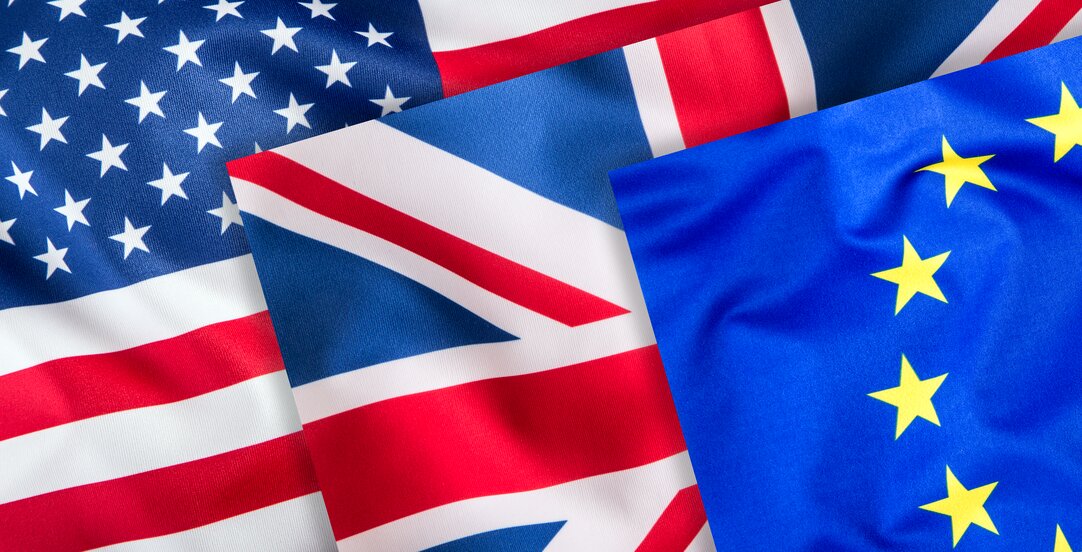Increasing US, EU and UK sanctions against Russia; Norwegian alignment with EU sanctions; new Russian countermeasures

Since our previous update on 21 March 2022, the US and UK have implemented additional sanctions in response to Russia's continued military aggression against Ukraine, and Norway has aligned its regime with the latest EU sanctions. Russia has responded with additional countermeasures. We outline the main points of these developments below.
Reading time 8 minutes
In light of the latest news of the Russian forces' attacks on civilians in Ukraine, a further increase in sanctions is expected soon.
Norwegian sanctions
On 24 March 2022, Norway implemented its second tranche of sanctions against Russia, transposing the EU's fourth sanctions package against Russia into Norwegian law.
In brief, and as further described in our previous update on 21 March 2022, these measures include:
- Ban on investments in the Russian energy sector
- Export restrictions targeting equipment, technology and services for the energy industry, and expansion of export controls on dual-use goods and technology which might contribute to the technological enhancement of Russia's defence and security sector.
- Ban on transactions with certain state-owned entities
- Ban on import of listed iron and steel products
- Ban on export of listed luxury goods
- Additional financial restrictions.
The new Norwegian sanctions build on Norway's implementation of the first three EU sanctions packages on 18 March 2022 and on the sanctions regime that Norway has maintained against Russia since 2014. Norway's sanctions against Russia are now almost fully aligned with the current EU sanctions regime, save for the EU restrictions related to certain Russian state-owned media outlets.
A press release from Norwegian authorities can be found here. The Norwegian implementing regulation is available here (log in), and the updated consolidated version of the Norwegian sanctions regulation can be found here (log in). Updated Q&As from the Norwegian ministry of Foreign Affairs are available here.
EU sanctions
The EU has not imposed further sanctions on Russia since our last update on 21 March 2022, where we outlined the EU sanctions imposed on 15 March 2022. Additional EU sanctions are likely to be imposed soon.
On 25 March 2022, the European Council concluded that the EU "remains ready to close loopholes and target actual and possible circumvention as well as to move quickly with further coordinated robust sanctions on Russia and Belarus to effectively thwart Russian abilities to continue the aggression". The announcement followed similar statements put forward in a joint statement from the G7-countries on 24 March 2022.
On 4 April 2022, the High Representative of the EU declared, as a response to the Russian acts in Bucha and other Ukrainian towns, that "[t]he EU will continue to firmly support Ukraine and will advance, as a matter of Urgency, work on further sanctions against Russia".
UK sanctions
Since our last update, the UK has added a number of Russian and Belarusian individuals and entities to its asset freeze sanctions lists.
Designations made on 24 March 2022 target persons and entities involved in Russia's strategic industries, as well as banks and business elites, such as Alfa Bank, see press release here. In addition, the UK recently announced additional designations, including (among others) additional business elites and individuals and entities linked to Russian state-owned media, see press release here. An overview of all OFSI notices, containing identifying information about the designated individuals and entities, is available here. An updated and consolidated version of the UK sanctions list is available here.
Furthermore, the UK has issued several new general licences. Most of these licences are aimed at allowing for a wind-down of positions towards certain designated persons, while some are aimed at a continuation of business and payments with other designated entities. An overview of the current UK general licences related to the Russia related sanctions can be found here.
On 25 March 2022, the UK imposed additional duties on a number of commodities originating in Russia and Belarus. Guidance on these additional duties is available here.
Expanded sanctions, and new legal powers, have also recently been put in place. On March 30 2022, the UK adopted The Russia (Sanctions) (EU Exit) (Amendment) (No. 7) Regulations 2022, to prevent Russian oligarch's access to UK aviation and maritime technical services. In short, the new legislation:
- extends the current finance, shipping and trade sanctions relating to Crimea to cover also the non-government controlled regions of Donetsk and Luhansk in eastern Ukraine;
- imposes a prohibition on the direct or indirect provision of technical assistance relating to aircraft or ships belonging to designated persons, and thus aims to restrict sanctioned oligarchs from benefitting from the UK’s aviation and maritime industries and engineers; and
- confers a power on the Secretary of State to designate persons by description (instead of designating them by name)
A press release on this legislation can be found here.
US sanctions
Since 21 March 2022, the US has added several new individuals and entities to its SDN List. Among the new designations are several hundred members of the Russian Duma, entities operating in Russia's military-industrial complex, entities operating in the Russian technology sector, and entities described to be part of the Kremlin's sanctions evasion network. A summary of these designations, including identifying information of the designated individuals and entities, is available here and here. Press releases are available here and here.
In addition, on March 31 2022, the US expanded its Russia-related sanctions authority by determining that three additional sectors of the Russian economy, namely the aerospace, electronics and marine sectors, are subject to sanctions pursuant to Executive Order 14024, cf. section 1(a)(i). This specifically allows for sanctions to be imposed on any individual or entity determined to operate or have operated in any of those sectors. The determination document is available here.
We note that OFAC has recently also issued several new General Licences for its Russian sanctions regime, which authorise certain transactions which would otherwise be prohibited. An overview of these licences can be found here.
Additional EU, US and UK sanctions are expected within short
Last week, the EU and the US met in Brussels to review their ongoing efforts to impose economic costs on Russia. Following the meeting, both parties, as well as other G7 countries, underlined their readiness to adopt additional measures as required and to stop any attempts to circumvent sanctions.
The threats of additional sanctions have increased during the latest days. Especially in light of the latest news of Russian forces' attacks on civilians in Ukraine, the imposition of further EU, US and UK sanctions are expected to be announced shortly. Norway will likely align itself with any such EU sanctions.
Russian countermeasures
Since our last update on Russian countermeasures on 21 March 2022, new tranches of countermeasures against so-called "unfriendly states" (see the list of these states in our 9 March 2022 update here) have been announced and implemented in Russia.
Rubles-for-gas scheme
On 23 March 2022, President Putin stated that Russia would no longer accept payment for natural gas supplies in dollars or euros from gas buyers related to so-called "unfriendly states", and that the gas buyers from these states henceforth would have to pay for gas supplies in Russian rubles. A few days later, on 28 March 2022, Putin ordered the Russian Government, the Russian Central Bank and Gazprom to present a plan to implement the rubles-for-gas scheme by 31 March 2022. Then, on 31 March 2022, Putin issued a Presidential Decree "on a special procedure for the fulfilment of obligations by foreign buyers towards Russian suppliers of natural gas" (see an unofficial media translation of the Decree into English here), setting out the further specifics of this scheme.
Essentially, the Decree requires gas buyers from "unfriendly states" to (i) open a foreign currency account and a ruble account in Gazprombank, (ii) transfer the due amount in the contractual currency to the foreign currency account, (iii) instruct Gazprombank to sell the foreign currency at the Moscow interbank currency exchange, (iv) transfer the ruble amount received from the sale on the buyer's ruble account, and then (v) transfer the ruble amount to the gas seller's account in Gazprombank. The payment obligation will then be considered fulfilled under the Decree.
The Decree allows for exceptions to be made by the Russian Government Commission for the Control of Foreign Investments in the Russian Federation (i.e. apparently allowing for de jure payment in euros or dollars), but the further rules for such exceptions are not yet established. The Decree applies to all gas deliveries that take place after 1 April 2022. The Decree also prohibits Russian gas exporters from delivering gas if the seller does not pay for the gas in rubles. When the Decree was issued, Putin stated that failure to pay in rubles would be considered a breach of contract, implying that existing contracts then would be terminated.
On 1 April 2022, it was reported that Gazprom had begun notifying its European counterparts of the new ruble payment requirements. While most gas buyers or European states have not made their final position towards this scheme clear yet, many states, including the G7, have stated that they will not pay for gas in rubles. Lithuania has even announced that it is ceasing all Russian gas imports for domestic need as of this month. Payments for most of Gazprom's April deliveries are not due before late April or May, which means that the Decree may not be effectively tested before then.
Expansion of payment-in-rubles scheme to other export commodities and products
On 3 April 2021, Putin's spokesperson, Dmitriy Peskov, stated (Russian) that "he did not doubt" that the payment-in-rubles scheme eventually would be extended to other categories of products that are exported from Russia. This coincides with a statement on 30 March 2022 (Russian) by the Chairman of the Russian Duma, Vyacheslav Volodin, noting that Russia should only accept payments in rubles for exports of commodities including fertilisers, grains, oil, coal, metals and timber. Notably, this measure has already been introduced for payments for aircraft leased from so-called "unfriendly states".
Criminalisation of compliance with Western sanctions likely to be implemented within short
On 4 April 2022, the Russian Duma decided (Russian) to consider changes to the Russian Criminal Codex that will criminalise compliance with Western sanctions. The essence of the proposal is to criminalise actions aimed at implementing sanctions introduced by other states against Russia, performed by persons exercising managerial functions in a commercial or other kind of organisation. This penal clause will be added to the existing paragraph 2 of Article 201 of the Russian Criminal Code, which concerns the "abuse of powers". According to the draft law, such actions will be punishable by fines up to 1 million rubles, but may also lead to imprisonment for up to 10 years.
See also our 14 March 2022 alert here and 21 March 2022 here, where we have reported on and discussed this draft law.
Entry restrictions to Russia for citizens from so-called "unfriendly states"
On 28 March 2022, Russia's Minister for Foreign Affairs, Sergey Lavrov, stated (Russian) that the Russian Government is planning to introduce "a whole range of entry restrictions to Russia" for citizens from so-called "unfriendly states". The details of this countermeasure are not yet known, but Lavrov noted that it first of all would apply to those foreign citizens who are "complicit in doing crimes against Russian citizens abroad", initiate "unfounded legal proceedings against our people" and/or take "unfounded decisions that violate the rights and legal interests of citizens and organisations of the Russian Federation". Lavrov also made clear (Russian) that it would not apply to "ordinary Europeans" or foreign citizens who already are in the Russian Federation on valid grounds.
WR Sanctions Alerts provide you with updates on material developments in the country-specific sanctions programmes implemented by the US, the UN, the UK, the EU and Norway. We will not provide updates on mere prolongations, without material changes, of existing sanctions programmes, nor on any listings or de-listings of individuals/entities placed on implemented sanctions lists. Please note that the WR Sanctions Alerts are provided as general information and do not constitute legal advice.


